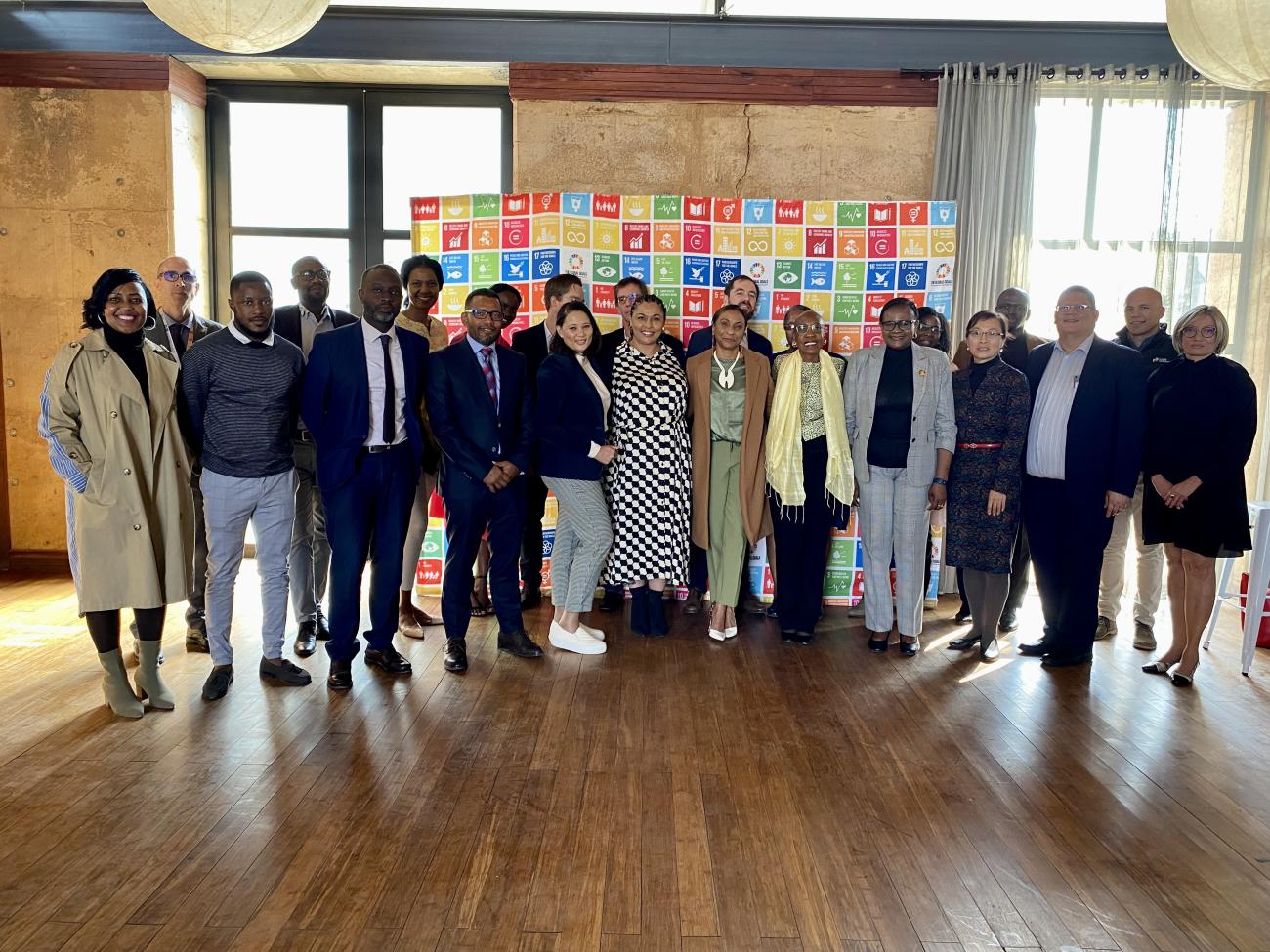A courtesy meeting between the recently appointed UN Namibia Resident Coordinator and the Private Sector

Private Sector and UN Collaborate for Sustainable Growth
The UN Resident Coordinator stressed that a mind shift for developing sustainable partnerships was needed, “otherwise we will get business as usual” results, and business leaders invited the UN to understand how their businesses operate, during the breakfast conversation to establish stronger engagement with the private sector to address development challenges and opportunities in Namibia.
The recently appointed UN Resident Coordinator, Ms. Hopolang Phororo, had a courtesy meeting with the private sector, as part of her introduction to key players in the development space.
The UN recognizes that the private sector plays a critical role in development to realize the Sustainable Development Goals (SDGs). It drives economic growth, innovation, and job creation. The existing partnership that the UN has with the SDGs Private Sector Alliance has been instrumental in implementing activities, hence the reason for this crucial engagement.
The courtesy meeting was well attended by key leaders from the private sector and the United Nations. The meeting was more than a courtesy meeting; it fostered an interactive discussion on the New UN Development System (UNDS) reform, the existing UN and Private sector partnerships through the SDGs Private Sector Alliance, and potential new collaboration opportunities to accelerate the achievement of the Sustainable Development Goals, as we have less than seven years left to achieve vision 2030.
The conversation began with an earnest reflection on what it will takes to craft successful collaboration between the UN and the private sector. Mr. Alonso Sebastiao from DHL gave a compelling story on the successful collaboration between DHL and the UN Accelerator Lab on e-commerce for SMEs to tap into the now available 1.3 billion African market through the Africa Continental Free Trade Area (AfCFTA). Business leaders expressed a desire for more than just surface-level partnerships with FirstRand Group CEO, Mr. Conrad Dempsey highlighting the need for a deeper understanding of the UN's role and requested that the private sector be involved from the onset in the strategic planning of the UN to ensure alignment and ownership from both parties. This is a timely suggestion as the UN system in Namibia is in the process of developing the next Cooperation Framework.
As the dialogue unfolded, the urgency of Namibia's youth unemployment rate, now surpassing 50%, became palpable. Leaders warned that peace and stability could be at risk without immediate action. "You cannot have this level of youth unemployment and think a generation ahead, you're going to have peace," one speaker noted, setting the tone for a meeting that would grapple complex challenges.
The spotlight shifted to the Duares Green Hydrogen Village project, a beacon of hope and innovation. Mr. Lutz Heiner Otto, the business developer, passionately outlined the potential of green hydrogen in Namibia, from producing green ammonia for fertilizers to aligning with the Sustainable Development Goals (SDGs). "Green hydrogen in Namibia is a once-in-a-lifetime chance," he declared, capturing the room's attention.
Other business leaders built on this momentum, emphasizing the need for strong institutions and clear policy direction (SDG 16). They called for a "big systemic shift" to attract significant capital investment into the country. The conversation was candid, acknowledging that uncomfortable discussions might be necessary to leverage the "muscle of the UN.”
Various business leaders including the Managing Director of Allan Gray Namibia, Ms. Birte Scheider, Mr. Nico Du Plessis of Plastic Packaging, and Mr. Roger Gertze of Multi-Choice touched on the importance of aligning business strategies with the SDGs and having frequent one-on-one discussions between the UN and individual companies to capture strategic collaboration. The UN's offer to support impact investment measurement and environmental, social, and governance standards was met with interest and appreciation from O & L group. I
Namibia's future was laid bare in a meeting that transcended sectors and industries. From green hydrogen to youth unemployment, the collaboration between the UN and the private sector, the message was clear: Namibia is too small for critical players to operate in isolation on development initiatives, and the time for partnerships and action is now.
The meeting concluded with a sense of optimism and determination. The path may be complex, but the commitment to collaboration, innovation, and sustainable development was unwavering. Namibia's future is bright, and this historic meeting may be the catalyst that ignites the spark.




